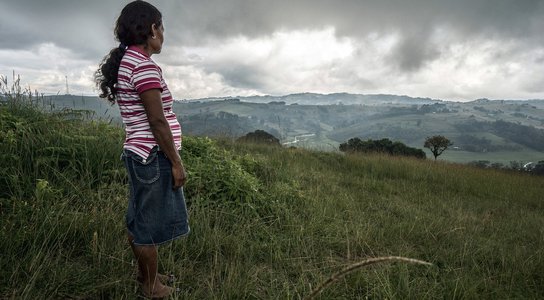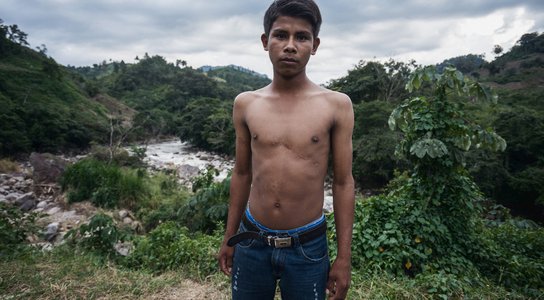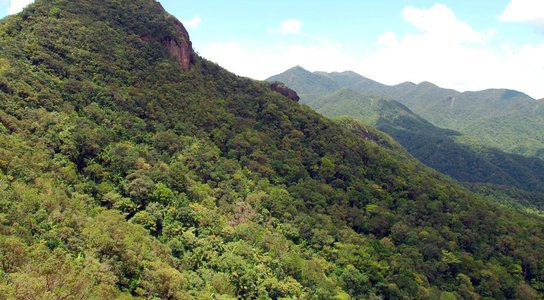EDIT: The trial for the murder of Berta Cáceres is now due to start 17th September 2018.
Monday 10th September 2018, Honduras - Global Witness has welcomed the start of the trial of eight men accused of the murder of high-profile indigenous leader Berta Cáceres – but have made renewed calls for real justice to take place as the proceedings unfold.
Together with other civil society organisations, Global Witness joins the Civic Council of Popular and Indigenous Organizations of Honduras (COPINH) – which Cáceres co-founded and led before her death – in calling on the Honduran government to prosecute those who ordered her killing, not just the eight accused of pulling the trigger who are on trial.
Cáceres was shot dead in March 2016 in her home town of Tegucigalpa after protesting the controversial Agua Zarca hydropower dam – less than a year after she was awarded the 2015 prestigious Goldman Environmental Prize.
She had received multiple death threats, attempted kidnappings and threats of sexual assault because of her opposition to the hydro-electric dam being built on indigenous community land in Río Blanco.
In 2017 Global Witness produced a report on attacks on land and environmental defenders in Honduras, highlighting the ties between the Honduran state, its military and DESA, the company building the dam. Most of those on trial for Cáceres’ murder have links with the Honduran military or DESA, but Global Witness and COPINH believe they don’t include those responsible for ordering her murder, who go higher up the food chain. (1)
130 land and environmental defenders, like Berta Cáceres, have been killed in Honduras since the 2009 coup. In fact, more of these activists have been killed in Honduras per capita than anywhere else in the world over the past decade (2).
Billy Kyte, Campaign Leader for Land & Environmental Defenders at Global Witness, said:
“This trial is a positive development in the attempt to hold some of the perpetrators of Berta’s killing accountable. But those who ordered the attack must be found, exposed and charged too.
“Honduras is one of the deadliest places in the world for land and environmental defenders and will remain so until the government tackles the root causes behind these crimes, such as impunity. Berta’s case is a historical opportunity to push back against this tide and the government must act now to ensure real justice is served.”
Berta Zúniga Cáceres, general coordinator of COPINH and Berta Cáceres’ daughter, said:
“We don’t want this trial to just be about ‘Justice for Berta,’ but rather, a contribution towards structural changes in the country. It should serve to denounce and transform the root causes of murders, persecution and repression that are left in impunity in Honduras.”
Together with Honduran social movements COPINH are carrying out a permanent sit-in protest in Honduras’ capital Tegucigalpa to create a space to build and exercise justice for communities. They invite other international organizations to participate and support COPINH, Berta’s family and the legal team seeking justice for her case.
/ ENDS
Contacts
Notes to editor:
(1) When asked to comment by Global Witness on these allegations, DESA denied any involvement in the murder of Berta Cáceres or any links between the company and the army or powerful business actors. This is despite confirming in a letter to Global Witness that DESA’s secretary, Roberto Pacheco Reyes, is the former minister for governance and justice and DESA’s President, Roberto David Castillo Mejía, was a member of the Honduran military.
(2) Last year Global Witness published a report, Honduras: The Deadliest Place To Defend The Planet, the result of over two years of in-depth, on the ground investigations into the killing, threats and intimidation of defenders in Honduras. The report highlighted the role of industry and government in attacks on Honduran defenders as well as the widespread culture of corruption, impunity and criminalisation in the country.
Additional information:
- In 2017 five land and environmental defenders were
murdered in Honduras, down from 14 in 2016. However, repression of human rights
defenders in general has worsened, with activists facing criminalisation, death
threats, police brutality and killings during protests.
- Lack of confidence in the judicial process remains
an issue, amid claimsprosecutors sat on evidence in the emblematic case of
Berta Cáceres.
Global Witness recommendations to the Government of Honduras to reduce the killings of land and environmental defenders:
- Tackle
root causes: Guarantee that the MACCIH (Mission of Support Against
Corruption and Impunity in Honduras) operates effectively, independently and
that its recommendations are fully implemented.
- Support
and protect: Ensure that the Mechanism for the Protection of Human Rights
Defenders takes actions to prevent attacks on defenders, and that its
protection measures are determined according to a risk analysis which fully
assesses the needs of the defender at risk.
- Ensure
accountability: Establish an independent international commission to
investigate human rights abuses in the context of the 2017 Presidential
election and its aftermath.
You might also like
-
Stop U.S. support for corruption and abuse in Honduras
Can you take two minutes today to call upon your Representative to act and end the murder of environmental activists in Honduras?
-
Report Honduras: the deadliest country in the world for environmental activism
More than 120 people have been killed in Honduras since 2010 for standing up to companies that grab land and trash the environment
-
Country page Honduras
When Manuel Zelaya was sworn in as Honduran President in 2006, he promised he would bring an end to the illegal logging that ravaged the country.